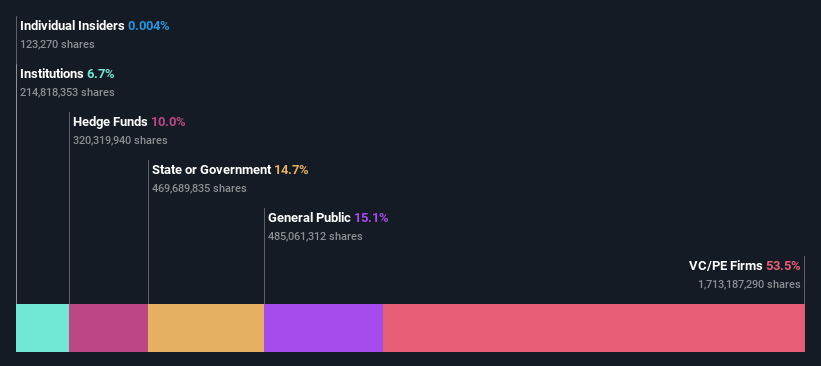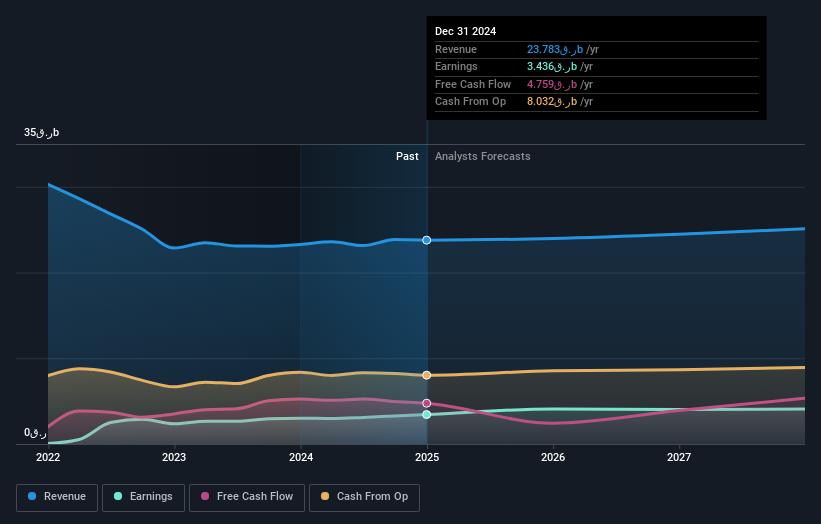- Qatar
- /
- Telecom Services and Carriers
- /
- DSM:ORDS
Individual investors own 15% of Ooredoo Q.P.S.C. (DSM:ORDS) shares but private equity firms control 53% of the company

Key Insights
- Significant control over Ooredoo Q.P.S.C by private equity firms implies that the general public has more power to influence management and governance-related decisions
- 53% of the company is held by a single shareholder (Qatar Holding LLC)
- Using data from analyst forecasts alongside ownership research, one can better assess the future performance of a company
Every investor in Ooredoo Q.P.S.C. (DSM:ORDS) should be aware of the most powerful shareholder groups. We can see that private equity firms own the lion's share in the company with 53% ownership. That is, the group stands to benefit the most if the stock rises (or lose the most if there is a downturn).
And individual investors on the other hand have a 15% ownership in the company.
Let's delve deeper into each type of owner of Ooredoo Q.P.S.C, beginning with the chart below.
See our latest analysis for Ooredoo Q.P.S.C

What Does The Institutional Ownership Tell Us About Ooredoo Q.P.S.C?
Institutions typically measure themselves against a benchmark when reporting to their own investors, so they often become more enthusiastic about a stock once it's included in a major index. We would expect most companies to have some institutions on the register, especially if they are growing.
We can see that Ooredoo Q.P.S.C does have institutional investors; and they hold a good portion of the company's stock. This implies the analysts working for those institutions have looked at the stock and they like it. But just like anyone else, they could be wrong. It is not uncommon to see a big share price drop if two large institutional investors try to sell out of a stock at the same time. So it is worth checking the past earnings trajectory of Ooredoo Q.P.S.C, (below). Of course, keep in mind that there are other factors to consider, too.

It would appear that 10.0% of Ooredoo Q.P.S.C shares are controlled by hedge funds. That worth noting, since hedge funds are often quite active investors, who may try to influence management. Many want to see value creation (and a higher share price) in the short term or medium term. Qatar Holding LLC is currently the company's largest shareholder with 53% of shares outstanding. With such a huge stake in the ownership, we infer that they have significant control of the future of the company. With 15% and 10.0% of the shares outstanding respectively, General Retirement and Social Insurance Authority and Abu Dhabi Investment Authority are the second and third largest shareholders.
Researching institutional ownership is a good way to gauge and filter a stock's expected performance. The same can be achieved by studying analyst sentiments. Quite a few analysts cover the stock, so you could look into forecast growth quite easily.
Insider Ownership Of Ooredoo Q.P.S.C
While the precise definition of an insider can be subjective, almost everyone considers board members to be insiders. Management ultimately answers to the board. However, it is not uncommon for managers to be executive board members, especially if they are a founder or the CEO.
I generally consider insider ownership to be a good thing. However, on some occasions it makes it more difficult for other shareholders to hold the board accountable for decisions.
Our most recent data indicates that insiders own less than 1% of Ooredoo Q.P.S.C.. As it is a large company, we'd only expect insiders to own a small percentage of it. But it's worth noting that they own ر.ق1.5m worth of shares. It is good to see board members owning shares, but it might be worth checking if those insiders have been buying.
General Public Ownership
The general public-- including retail investors -- own 15% stake in the company, and hence can't easily be ignored. While this group can't necessarily call the shots, it can certainly have a real influence on how the company is run.
Private Equity Ownership
Private equity firms hold a 53% stake in Ooredoo Q.P.S.C. This suggests they can be influential in key policy decisions. Some might like this, because private equity are sometimes activists who hold management accountable. But other times, private equity is selling out, having taking the company public.
Next Steps:
While it is well worth considering the different groups that own a company, there are other factors that are even more important. For instance, we've identified 1 warning sign for Ooredoo Q.P.S.C that you should be aware of.
Ultimately the future is most important. You can access this free report on analyst forecasts for the company.
NB: Figures in this article are calculated using data from the last twelve months, which refer to the 12-month period ending on the last date of the month the financial statement is dated. This may not be consistent with full year annual report figures.
New: AI Stock Screener & Alerts
Our new AI Stock Screener scans the market every day to uncover opportunities.
• Dividend Powerhouses (3%+ Yield)
• Undervalued Small Caps with Insider Buying
• High growth Tech and AI Companies
Or build your own from over 50 metrics.
Have feedback on this article? Concerned about the content? Get in touch with us directly. Alternatively, email editorial-team (at) simplywallst.com.
This article by Simply Wall St is general in nature. We provide commentary based on historical data and analyst forecasts only using an unbiased methodology and our articles are not intended to be financial advice. It does not constitute a recommendation to buy or sell any stock, and does not take account of your objectives, or your financial situation. We aim to bring you long-term focused analysis driven by fundamental data. Note that our analysis may not factor in the latest price-sensitive company announcements or qualitative material. Simply Wall St has no position in any stocks mentioned.
About DSM:ORDS
Ooredoo Q.P.S.C
Provides telecommunications services in Qatar, rest of the Middle East, Asia, and North Africa region.
Flawless balance sheet, undervalued and pays a dividend.
Market Insights
Community Narratives



